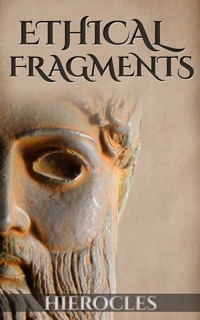“We ought always to deal justly, not only with those who are just to us, but likewise with those who endeavor to injure us; and this, for fear lest by rendering them evil for evil, we should fall into the same vice.”
Little is known about 2nd century Greek Stoic philosopher Hierocles. The only biographical reference to him is from his contemporary Aulus Gellius who describes him as a "grave and holy man.” Hierocles was famous for his Elements of Ethics, a book which was thought to be lost until part of it was discovered in a papyrus fragment at Hermopolis in 1901. The three hundred line fragment discusses self-perception, and argues that all birds, reptiles, and mammals from the moment of birth perceive themselves continuously and that self-perception is both the primary and the most basic faculty of animals.
Other surviving excerpts of Hierocles' writings focus on social relationships, marriage, household, and family. The Greek Stoic describes life as a series of concentric circles: the first circle is the human mind, next comes the immediate family, followed by extended family, the local community, neighboring towns, one’s country and finally the entire human race. Our duty, according to Hierocles was to draw the circles in towards the center, transferring people to the inner circles, making all human beings part of our concern.
The papyrus and all other extant fragments have been collected, translated and revised in Ethical Fragments, the most complete single volume of Hierocles’ writings available.
*Includes image gallery and essay ‘Stoic Doctrine.’



